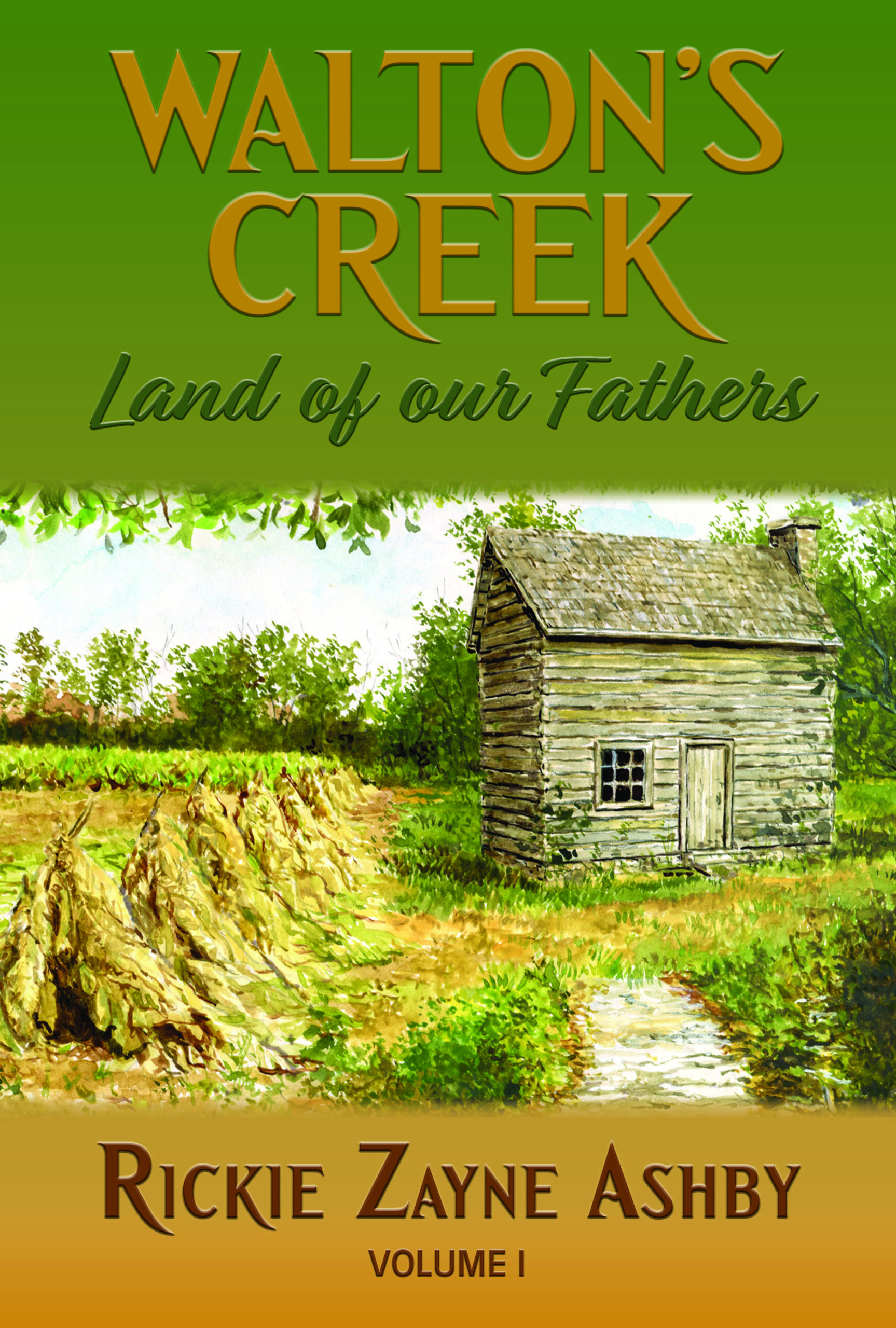Walton’s Creek: Land of Our Fathers is the fictional story of the Atlee and Caughill families as they live, love, and survive in the hills and hollers of Walton’s Creek, Kentucky.
The dialogue in this simple story is true to the dialect, vocabulary, and phrasings of the people of rural Western Kentucky in the early twentieth century. Volume One of a two-volume set, the narrative flows through time from the years 1913-1971.
Walton’s Creek native Rick Ashby based the characters on members of his own family, his parents and grandparents in particular, and reflects on what life was like in this humble but hard-working community. It is a land where families tilled the land and raised their own food, supplemented by meat from wild game … a place where men worked in the coal mines and women maintained the home with no indoor plumbing, all while trying to adapt to new technologies and changes to the American way of life.
Walton’s Creek: Land of Our Fathers is the perfect companion piece to Ashby’s first book, At the End of the Road: My Journey from Walton’s Creek, Kentucky—a look back at simpler times not unlike other communities in rural America.
Proceeds from the sale of this book will also help other communities and organizations preserve their history through Our American Heritage Project, a non-profit organization.
About The Author
Photographer
Reviews
“Walton’s Creek: Land of Our Fathers (Volume 1),” by Rickie Zayne Ashby. Morley, MO: Acclaim Press, 2024. 272 pages. $29.95.
“The year was 1807 when wooden carts pulled by teams of oxen topped a small hill near the tiny stream called Walton’s Creek,” Rickie Zayne Ashby explains at the beginning of “Walton’s Creek: Land of Our Fathers (Volume 1),” his recently-released sophomore excursion into a past that many of us know all-too-well. “Jake Atlee and his large family surveyed a landscape of 1,000 acres in a small valley that had been purchased from surveyor Matthew Walton.”
“The pristine area was what Jake called their Promised Land,” Ashby continues. “It had been a long journey from Virginia, but the Atlees had finally found the land of their dreams and home for them and their descendants for over two centuries. Jake declared that the Walton’s Creek community is where God wanted them to always live. The book of Isaiah was prominent in the minds of the Atlee clan. The 1000-acre survey was indeed their land of milk and honey.”
So begins Ashby’s latest foray into what life was like in this corner of the world for a vast majority of country folk whose descendants still inhabit the ground they made their own only a couple of generations after the region was originally settled by pioneers who were surely but steadily moving civilization across the great expanse of the United States. And even though I was born and raised in Tennessee, the similarities to my own experience are eerily unmistakable. Yes, this is a “novel,” but it is so close to reality that it might as well have been a true story – and probably was for many families who lived through the harsh conditions Ashby describes.
Witness the following from “Working for Cyrus (1929-1931),” the fourth chapter and one of my personal favorites:
“All his life Mickey heard countless accounts of family hardships – none of these stories impressed him more than the vivid accounts of the Great Depression. Like most people, Mickey’s father’s family struggled; but the family farm was secure and provided shelter and sustenance, even if money was scarce for clothes and other necessities of life. The real struggle was in his mom’s family.”
“Jes Caughill was nearly 60 before he owned a modest home of his own. He worked in numerous coal mines while living in company housing, farmed, and worked in timber. Mickey’s maternal grandfather never failed to provide for his family, but the early years of the Depression were the most trying in his life. That was why, to Mickey, stories about the three years the Caughills lived in a borrowed house and worked for Cyrus Lentz were the most compelling and entertaining in the oral tradition of the family.”
I remember my grandparents – I had all four of them until I was in college – recalling on many occasions what life was like during that exceptionally challenging period in our collective history. Ashby captures both the reality as well as the ambiance of the era perfectly. I could almost hear my grandfather’s voice uttering a barely audible “Amen” at several points when I was reading the book.
Structurally, “Walton’s Creek” is comprised of three “books,” each adding a critical dimension to the story Ashby is telling. Book One, “A Wondrous Requiem,” consists exclusively of “Where the Creek still Flows,” an episode from 2008 which in many ways sets the stage for what follows. Book Two, “Sweat, Tears and Endearment,” is made up of five chapters and covers the years from 1913 to 1947. Finally, Book Three, “A Very Common Place,” also includes five chapters and takes the reader from 1952 to 1955. There is a subtle yet undeniable symmetry to the author’s prose – an equilibrium that reveals itself gradually the further the reader delves into this mesmerizing look at a time many of us relate to in such a visceral manner. I should add that the manuscript is beautifully illustrated by Eric Lindgren and Joe Vick in a style that reminds me of some of the Stephen Covey (“The Seven Habits of Highly Effective People”) catalog.
One of the most endearing features of Ashby’s writing involves the explicitly authentic voice that permeates his narrative. I grew up surrounded by people who talked exactly the way they do in “Walton’s Creek,” and it brought back several warm memories from my childhood and adolescence. Check out the following from “Aunt Polly’s Iced Tea (1953),” one of the concluding chapters, for an illuminating glimpse of what I mean:
“Now, my young man, gonna go over to yere Uncle Al’s and Aunt Polly’s today. Gonna spend the whole day. I done give ye yere marchin’ orders, but I’m gonna do it ag’in. Better pay attention. Uncle Al and Aunt Polly ain’t used to no snotty nosed kids a runnin’ ‘round the house and ding dongin’ them ever 15 minutes for somethin’ to eat or drink. Stay outta the house ‘cept when I call ye for dinner. When we set down to dinner, don’t be askin’ for nothin’. I’ll fill yere plate, and don’t ye take a bite ‘til the grownups start to eat. Mind yere manners, and don’t ask for seconds, or I’ll wear ye out when we get home.”
It could almost hear my beloved Granny giving me similar advice – on more than one occasion – when I used to visit her family and friends back in the early 1960s.
Full disclosure: I have known Ashby for over 25 years. He had a long and distinguished career at Western Kentucky University before eventually retiring to pursue his passions of gardening and reading. When he mentioned this project at one of our breakfast meetings at Lisa’s Fifth Street Diner here in Bowling Green, I was instantly intrigued by the concept he described. I have always been fascinated by the similarities in our childhoods and upbringing. As such, the subject matter he knows so well is instinctively familiar and appealing to me on many levels. Moreover, I loved his first book, “At the End of the Road: My Journey from Walton’s Creek, Kentucky,” which he published in 2017 and I reviewed in the Daily News on February 4, 2018. His latest offering is an extension of that first effort – but it is also apparent that he is continuing to improve as an author. I am really looking forward to “Volume 2,” which I plan to review in the Daily News when it is published.
If you are a fan of historical fiction (and even if you’re not), my sense is that most readers – especially those who have roots in this part of the country – will find “Walton’s Creek: Land of Our Fathers (Volume 1)” irresistible. Honestly, I stayed up way too late on a couple of nights completely enthralled by this heart-wrenching tale of perseverance and the unparalleled power and importance of family in life’s journey. Highly recommended.
-Reviewed by Aaron W. Hughey, University Distinguished Professor, Department of Counseling and Student Affairs, WKU.Reviews
5.0 out of 5 stars Old KY Living
Reviewed in the United States on April 6, 2024
Verified Amazon Purchase
A masterfully engaging novel exemplifying the reality and struggles of an extended rural Kentucky family and changes in their lives and lifestyle during depression era times and the years to follow. It makes the reader simultaneously wish for simpler times and thankful for the conveniences of modern life. This book gets my highest recommendation.
-Brant BReviews
5.0 out of 5 stars Very entertaining read
Reviewed in the United States on March 28, 2024
Verified Amazon Purchase
Interesting read of the life of folks growing up in rural Kentucky. Families working together to survive. Loved the way they talked
-Robot34Reviews
5.0 out of 5 stars Hard work in simpler times
Reviewed in the United States on March 28, 2024
Verified Amazon Purchase
In this book, Rickie Ashby does for Depression era, rural Kentucky what other notable Southern authors have done for their families and communities. The solution to hard times is a united, loving family willing to work together to survive against all odds. Enjoyable read and journey
-Michael E JohnsonIllustrator
Book Details
Author: Rickie Zayne AshbyProduct Dimensions: 6" x 9"
ISBN: 978-1-956027-71-6
Cover Type: Hardcover
Case Quantity:

